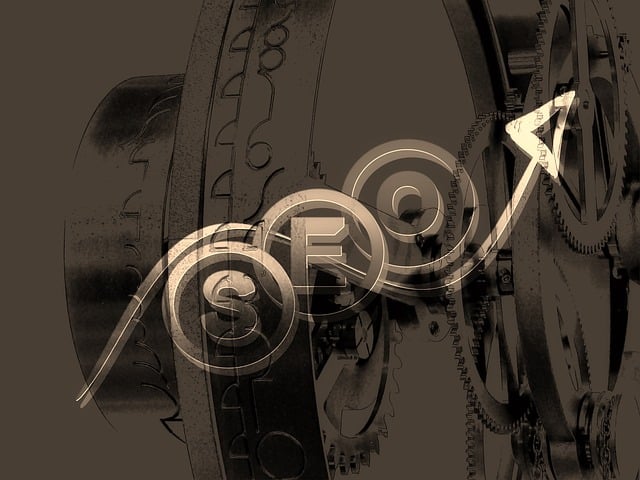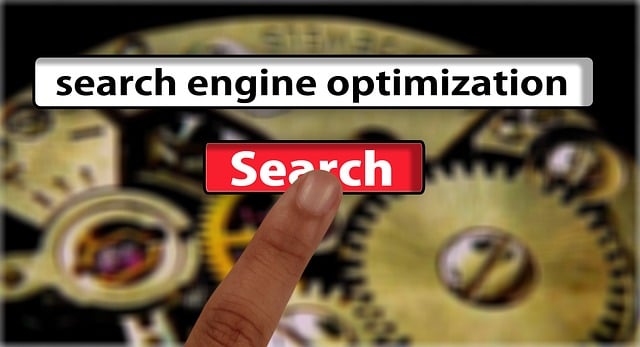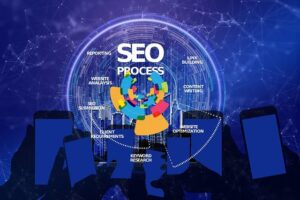Online retailers seeking to thrive in a competitive digital marketplace need a robust SEO strategy, with an SEO Agency for E-commerce Websites playing a pivotal role. Through keyword research using tools like Google Keyword Planner and SEMrush, these agencies help e-commerce sites target long-tail keywords accurately reflecting customer intent. Optimizing product pages with compelling content and ensuring mobile responsiveness improves user experience and search rankings. Creating high-quality, relevant content boosts organic traffic and strengthens online authority through backlinks from reputable sources. Technical SEO ensures website infrastructure is optimized for faster loading times and effective crawling by search engines. KPI tracking allows data-driven strategies to enhance performance and optimize search visibility.
In today’s digital landscape, a robust online presence is non-negotiable for retail success. This article serves as a comprehensive guide for e-commerce businesses seeking to maximize their potential through effective SEO strategies. From understanding the fundamentals of e-commerce SEO to leveraging high-quality content and building impactful backlinks, each section equips retailers with tools to enhance visibility and drive organic traffic. Discover how these tactics can propel your online retailer ahead of the competition, making it a go-to destination for your target audience – even for those turning to a SEO Agency for E-commerce Websites for expert support.
Understanding E-commerce SEO: The Basics for Online Retailers

For online retailers, understanding Search Engine Optimization (SEO) is paramount to driving traffic and sales. E-commerce SEO involves optimizing your website to rank higher in search engine results pages for relevant keywords and phrases that potential customers use when looking for products or services like yours. A top position in search results not only boosts visibility but also inspires trust and credibility among shoppers.
An effective SEO strategy for e-commerce sites includes keyword research, creating high-quality product descriptions and content, optimizing website structure and loading speed, implementing structured data markup, and building a solid backlink profile. Working with an experienced SEO agency specializing in e-commerce websites can significantly enhance these efforts. Such agencies leverage advanced tools and techniques to ensure your online store isn’t just seen but also converts visitors into loyal customers.
Keyword Research Strategies for Targeting the Right Audience

In the competitive landscape of online retail, understanding your target audience and their search behaviors is paramount. Keyword research strategies are a fundamental tool for any SEO agency specializing in e-commerce websites. By delving into tools like Google Keyword Planner, Ahrefs, or SEMrush, retailers can uncover valuable insights into customer queries, search volumes, and competitive landscapes. This process involves identifying long-tail keywords—specific phrases with lower competition that often reflect genuine user intent.
Targeted keyword research ensures that online stores appear in relevant searches, attracting potential customers who are actively looking for their products or services. It’s not just about choosing the right words; it’s about understanding the customer journey and aligning your website’s content to satisfy at each stage. Effective strategies lead to better visibility, increased organic traffic, and stronger connections with the audience, ultimately driving sales growth for e-commerce businesses.
Optimizing Product Pages for Better User Experience and Search Rankings

Optimizing product pages is a strategic move for any online retailer aiming to boost user experience and search rankings. As a top SEO agency for e-commerce websites understands, each product page should be tailored as a standalone content piece with clear, concise, and compelling information. This includes rich, high-quality visuals, detailed product descriptions, and relevant keywords integrated naturally throughout the text. By enhancing these elements, you ensure that your product pages not only attract and engage visitors but also communicate effectively with search engines, leading to improved visibility on search results pages.
Furthermore, streamlining the user journey through intuitive navigation, fast loading times, and mobile responsiveness is vital. A well-optimized product page guides users towards a clear call to action, encouraging conversions. This strategy aligns with SEO best practices, as search engines prioritize websites that offer seamless user experiences. Therefore, by focusing on these optimizations, online retailers can attract more organic traffic, increase sales, and outrank competitors in the digital marketplace.
Leveraging High-Quality Content to Drive Organic Traffic

Creating high-quality, relevant content is a powerful strategy for any online retailer looking to boost their organic traffic and outrank competitors. An SEO agency for e-commerce websites understands that well-crafted content not only attracts but also retains customers, increasing the chances of conversions. By incorporating keywords naturally into compelling product descriptions, blog posts, and how-to guides, retailers can enhance their search engine rankings and drive more relevant visitors to their sites.
This approach goes beyond mere keyword stuffing; it involves providing value to potential buyers by addressing their questions, offering solutions, and sharing industry insights. Such content not only improves user experience but also encourages social sharing and backlinks, further strengthening the retailer’s online presence.
The Role of Technical SEO in Enhancing Website Performance

Technical SEO plays a pivotal role in enhancing the performance and visibility of e-commerce websites, acting as a cornerstone for any successful online retail strategy. It involves optimizing website infrastructure to ensure seamless user experiences, faster loading times, and effective crawling by search engine algorithms. An experienced SEO agency for e-commerce understands that addressing technical issues like mobile responsiveness, schema markup implementation, and XML sitemaps creation not only improves page rankings but also boosts customer satisfaction.
By implementing robust technical SEO practices, online retailers can mitigate issues that may hinder website performance, such as broken links, duplicate content, or complex navigation structures. These optimizations directly impact search engine results pages (SERPs), increasing the likelihood of higher rankings and improved organic traffic. Ultimately, a well-optimized e-commerce site not only attracts more potential customers but also encourages them to explore and make purchases, leading to increased sales and revenue.
Building Effective Backlinks for E-commerce Websites

Building effective backlinks is a cornerstone strategy for any successful SEO agency working with e-commerce websites. These links act as digital endorsements, signaling to search engines that your site offers valuable content and resources. E-commerce sites should focus on acquiring backlinks from reputable, industry-relevant sources such as influential blogs, established brands, and product review websites. This strategic approach not only boosts your website’s authority but also drives targeted traffic, increasing the likelihood of conversions.
An SEO agency for e-commerce can help cultivate these backlinks through various methods including guest blogging, influencer outreach, and creating high-quality, shareable content. By implementing these tactics, retailers can build a robust backlink profile that strengthens their online presence and improves their rankings in search results, ultimately leading to increased visibility and sales.
Measuring and Analyzing SEO Success: Key Metrics to Track

Measuring and analyzing SEO success is a crucial step for any online retailer looking to stay competitive in today’s digital marketplace. By tracking key performance indicators (KPIs), e-commerce businesses can gain valuable insights into what tactics are working and where improvements are needed. These metrics extend beyond mere website traffic, encompassing various aspects of user engagement and conversion rates.
Some essential KPIs for evaluating SEO success include bounce rate, average session duration, pages per session, conversion rates, and return visitors. A low bounce rate indicates that users are finding relevant content on the site and engaging with it, while a high average session duration suggests that visitors are spending more time exploring products or services. Tracking conversion rates allows retailers to gauge how effectively SEO efforts are driving sales, while return visitors demonstrate the level of brand loyalty and website stickiness. An SEO agency for e-commerce websites should be adept at monitoring these metrics and providing data-driven strategies to optimize online retail performance.
